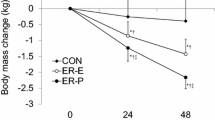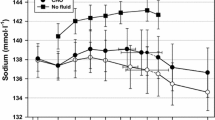Abstract
Following a 2.0 ± 0.1% body mass loss induced by intermittent exercise in the heat, seven male volunteers ingested either a carbohydrate–electrolyte solution (CE) or skimmed milk (M) in a volume equal to 150% of body mass loss. At the end of the 3 h recovery period, subjects were essentially in positive fluid balance on trial M (191 ± 162 mL), and euhydrated on trial CE (−135 ± 392 mL) despite being in negative sodium balance on both trials and negative potassium balance on trial CE. This difference of 326 ± 354 mL or 0.4% body mass approached significance (P = 0.051). Subjects ingested 137 ± 15 and 113 ± 12 g of CHO during the CE and M trials, respectively, as well as 75 ± 8 g of protein during the M trial. At the end of the 3 h recovery period, an exercise capacity test was completed at 61% VO2peak in warm (35.3 ± 0.5°C), humid (63 ± 2%) conditions. HR (P = 0.020) and rectal temperature (P = 0.045) were higher on trial M, but no difference in exercise time to exhaustion was observed between trials (39.6 ± 7.3 min vs. 39.7 ± 8.1 min on trials CE and M, respectively). The results of the present study suggest that milk can be an effective post-exercise rehydration drink, with subjects remaining in net positive fluid balance throughout the recovery period. Despite the effect on fluid retention, exercise capacity was not different between skimmed milk and a commercially available carbohydrate–electrolyte drink 4 h following exercise/heat-induced body mass loss.



Similar content being viewed by others
References
Armstrong LE, Costill DL, Fink WJ (1985) Influence of diuretic-induced dehydration on competitive running performance. Med Sci Sports Exerc 17:456–461. doi:10.1249/00005768-198508000-00009
Borg GA (1982) Psychophysical bases of perceived exertion. Med Sci Sports Exerc 14:377–381
Calbet JAL, MacLean (1997) Role of calorie content on gastric emptying in humans. J Physiol 498:553–559
Casa DJ, Armstrong LE, Hillman S, Montain SJ, Reiff RV, Rich BSE et al (2000) National athletic trainers association position statement: Fluid replacement for athletes. J Athl Train 35:212–224
Coggan AR, Coyle EF (1987) Reversal of fatigue during prolonged exercise by carbohydrate infusion or ingestion. J Appl Physiol 63:2388–2395
Coyle EF (2004) Fluid and fuel intake during exercise. J Sports Sci 22:39–55. doi:10.1080/0264041031000140545
de Vrese M, Stegelmann A, Richter B, Fenselau S, Laue C, Schrezenmeir J (2001) Probiotics—compensation for lactase insufficiency. Am J Clin Nutr 73:421S–429S
Dill DB, Costill DL (1974) Calculation of percentage changes in volumes of blood, plasma, and red cells in dehydration. J Appl Physiol 37:247–248
Elliot TA, Cree MG, Sanford AP, Wolfe RR, Tipton KD (2006) Milk ingestion stimulates net muscle protein synthesis following resistance exercise. Med Sci Sports Exerc 38:667–674. doi:10.1249/01.mss.0000210190.64458.25
Fallowfield JL, Williams C, Singh R (1995) The influence of ingesting a carbohydrate-electrolyte beverage during 4 hours of recovery on subsequent endurance capacity. Int J Sport Nutr 5:285–299
Ivy JL, Katz AL, Cutler CL, Sherman WM, Coyle EF (1988) Muscle glycogen synthesis after exercise: effect of time of carbohydrate ingestion. J Appl Physiol 64:1480–1485
Karp JR, Johnston JD, Tecklenburg S, Mickleborough TD, Fly AD, Stager JM (2006) Chocolate milk as a post-exercise recovery aid. Int J Sport Nutr Exerc Metab 16:78–91
Maughan RJ, Leiper JB (1995) Sodium intake and post-exercise rehydration in man. Eur J Appl Physiol Occup Physiol 71:311–319. doi:10.1007/BF00240410
Maughan RJ, Shirreffs SM, Watson P (2007) Exercise, heat, hydration and the brain. J Am Coll Nutr 26:604S–612S
McHugh PR, Moran TH (1979) Calories and gastric emptying: a regulatory capacity with implications for feeding. Am J Physiol 236:R254–R260
Nadel ER, Mack GW, Nose H (1990) Influence of fluid replacement beverages on body fluid homeostasis during exercise and recovery. In: Gisolfi CV, Lamb DR (eds) Perspectives in exercise science and sports medicine, fluid homeostasis during exercise, vol 3. Benchmark Press, Carmel, pp 181–205
Nielsen B, Sjogaard G, Ugelvig J, Knudsen B, Dohlmann B (1986) Fluid balance in exercise dehydration and rehydration with different glucose-electrolyte drinks. Eur J Appl Physiol Occup Physiol 55:318–325. doi:10.1007/BF02343806
Niles ES, Lachowetz T, Garfi J, Sullivan W, Smith JC, Leyh BP, Headley SA (2001) Carbohydrate-protein drink improves time to exhaustion after recovery from endurance exercise. JEP online 4:45–52
Nose H, Mack GW, Shi XR, Nadel ER (1988) Role of osmolality and plasma volume during rehydration in humans. J Appl Physiol 65:325–331
Passe DH (2001) Physiological and psychological determinants of fluid intake. In: Maughan RJ, Murray R (eds) Sports drinks: basic science and practical aspects. CRC Press, Boca Raton, pp 45–87
Pitsiladis Y, Maughan RJ (1999) The effects of exercise and diet manipulation on the capacity to perform prolonged exercise in the heat and cold in trained humans. J Physiol 517:919–930. doi:10.1111/j.1469-7793.1999.0919s.x
Ramanathan NL (1964) A new weighting system for mean surface temperature of the human body. J Appl Physiol 19:531–533
Sawka MN, Pandolf KB (1990) Effects of body water loss on physiological function and exercise performance. In: Gisolfi CV, Lamb DR (eds) Perspectives in exercise science and sports medicine, vol 3. fluid homeostasis during exercise, Benchmark Press Carmel, pp 1–38
Sawka MN, Burke LM, Eichner ER, Maughan RJ, Montain SJ, Stachenfeld NS (2007) American college of sports medicine position stand. Exercise and fluid replacement. Med Sci Sports Exerc 39:377–390. doi:10.1249/mss.0b013e31802ca597
Shirreffs SM, Maughan RJ (2000) Rehydration and recovery after exercise. Exerc Sport Sci Rev 28:27–32
Shirreffs SM, Aragon-Vargas LF, Kiel M, Love TD, Phillips S (2007a) Rehydration following exercise in the heat: a comparison of four commonly used drinks. Int J Sport Nutr Exerc Metab 17:244–256
Shirreffs SM, Taylor AJ, Leiper JB, Maughan RJ (1996) Post-exercise rehydration in man: effects of volume consumed and drink sodium content. Med Sci Sports Exerc 28:1260–1271. doi:10.1097/00005768-199610000-00009
Shirreffs SM, Watson P, Maughan RJ (2007b) Milk as an effective rehydration drink. Br J Nutr 98:173–180. doi:10.1017/S0007114507695543
van Loon LJ, Saris WH, Kruijshoop M, Wagenmakers AJ (2000) Maximizing post-exercise muscle glycogen synthesis: carbohydrate supplementation and the application of amino acid or protein hydrolysate mixtures. Am J Clin Nutr 72:106–111
Vist GE, Maughan RJ (1995) The effect of osmolality and carbohydrate content on the rate of gastric emptying of liquids in man. J Physiol 486:523–531
Wemple RD, Morocco TS, Mack GW (1997) Influence of sodium replacement on fluid ingestion following exercise-induced dehydration. Int J Sport Nutr 7:104–116
Wojcik JR, Walberg-Rankin J, Smith LL, Gwazdauskas FC (2001) Comparison of carbohydrate and milk-based beverages on muscle damage and glycogen following exercise. Int J Sport Nutr Exerc Metab 11:406–419
Wong SH, Williams C (2000) Influence of different amounts of carbohydrate on endurance running capacity following short term recovery. Int J Sports Med 21:444–452. doi:10.1055/s-2000-3831
Zawadzki KM, Yaspelkis BB 3rd, Ivy JL (1992) Carbohydrate-protein complex increases the rate of muscle glycogen storage after exercise. J Appl Physiol 72:1854–1859
Acknowledgments
Supported by a grant from the Milk Development Council.
Author information
Authors and Affiliations
Corresponding author
Rights and permissions
About this article
Cite this article
Watson, P., Love, T.D., Maughan, R.J. et al. A comparison of the effects of milk and a carbohydrate-electrolyte drink on the restoration of fluid balance and exercise capacity in a hot, humid environment. Eur J Appl Physiol 104, 633–642 (2008). https://doi.org/10.1007/s00421-008-0809-4
Accepted:
Published:
Issue Date:
DOI: https://doi.org/10.1007/s00421-008-0809-4




